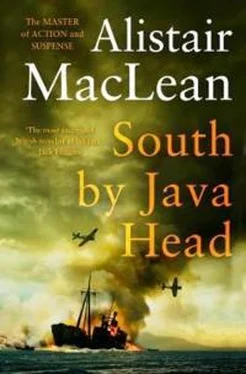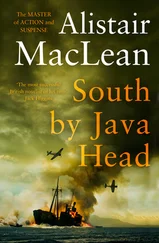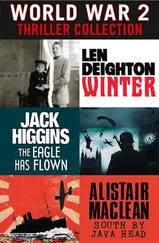Nicolson didn’t hesitate. “Give them back the gun, Fourth.”
“The gun?” Vannier was apprehensive, and looked it. “But how do you know–”
“I don’t. Give them the gun.” Nicolson thrust the Colt into his belt.
Reluctantly, Vannier handed the rifle back to the man in the straw hat. The man snatched it, folded his arms over his gun and stared off into the forest. The young man looked at him in exasperation, then smiled apologetically to Nicolson.
“You must excuse my father,” he said haltingly, “You have hurt his feelings. Men do not take guns from him.”
“Why?”
“Because Trikah is Trikah, and nobody dare.” The young man’s voice held a blend of affection and pride and amusement. “He is the headman of our village.”
“He is your chief?” Nicolson looked at Trikah with new interest. On this man, on his capacity to make decisions, to lend or refuse aid, all their lives might depend.
Now that he looked closely, Nicolson could see in the lined brown face, grave and unsmiling, the authority, the repose one would associate with the ruler of a tribe or village. Trikah, in appearance, was very like his son and the boy who stood some distance behind them – a younger son, Nicolson guessed. All three shared the low, wide forehead, intelligent eyes, finely chiselled lips and thin, almost aquiline nose: they had no negroid characteristics whatsoever, were almost certainly of unmixed Arabian descent. A good man to help you, Nicolson thought – if he would help you.
“He is our chief,” the young man nodded. “I am Telak, his eldest son.”
“My name is Nicolson. Tell your father I have many sick English men and women on the beach, three miles to the north. We must have help. Ask him if he will help us.”
Telak turned to his father, spoke rapidly in a harsh staccato tongue for a minute, listened to his father, then spoke again. “How many are sick?”
“Five men – at least five men. There are also three women – I do not think they could walk far. How many miles is it to your village?”
“Miles?” Telak smiled. “A man can walk there in ten minutes.” He spoke again to his father, who nodded several times as he listened, then turned and spoke briefly to the young boy by his side. The boy listened intently, appeared to repeat instructions, flashed his white teeth in a smile at Nicolson and Vannier, turned quickly and ran off in the direction he had come.
“We will help you,” Telak said. “My young brother has gone to the village – he will bring strong men and litters for the sick. Come, let us go to your friends.”
He turned, led the way into an apparently impenetrable patch of forest and undergrowth, skirted the swamp through which Nicolson and Vannier had so lately waded, and led them back on to the path again, all inside a minute. Vannier caught Nicolson’s eye and grinned.
“Makes you feel stupid, doesn’t it? Easy enough when you know how.”
“What does your friend say?” Telak asked.
“Just that he wishes we had had you with us earlier on,” Nicolson explained. “We spent most of our time wading up to the waists in swamps.”
Trikah grunted an inquiry, listened to Telak, then muttered to himself. Telak grinned.
“My father says only fools and very little children get their feet wet in the forest. He forgets that one must be used to it.” He grinned again. “He forgets the time – the only time – he was ever in a car. When it moved off he jumped over the side and hurt his leg badly.”
Telak talked freely as they walked along through the filtered green light of the jungle. He made it quite obvious that he and his father were in no way pro-British. Nor were they pro-Dutch nor pro-Japanese. They were just pro-Indonesian, he explained, and wanted their country for themselves. But, once the war was over, if they had to negotiate with anyone for the freedom of their country, they would rather do it with the British or the Dutch. The Japanese made great protestations of friendship, but once the Japanese moved in on a country, they never moved out again. They asked for what they called co-operation, Telak said, and already they were showing that if they didn’t get it one way, willingly, they would get it another – with the bayonet and the tommy-gun.
Nicolson looked at him in quick surprise and sudden dismay.
“There are Japanese near here? They have landed, then?”
“Already they are here,” Telak said gravely. He gestured to the east. “The British and Americans still fight, but they cannot last long. Already the Japanese have taken over a dozen towns and villages within a hundred miles of here. They have – what do you call it – a garrison, they have a garrison at Bantuk. A big garrison, with a colonel in charge. Colonel Kiseki.” Telak shook his head like a man shivering with cold. “Colonel Kiseki is not human. He is an animal, a jungle animal. But the jungle animals kill only when they have to. Kiseki would tear the arm off a man – or a little child – as a thoughtless child would pull the wings off a fly.”
“How far away from your village is this town?” Nicolson asked slowly.
“Bantuk?”
“Where the garrison is. Yes.”
“Four miles. No more.”
“Four miles! You would shelter us – you would shelter so many within four miles of the Japanese! But what will happen if–”
“I am afraid that you cannot stay long with us,” Telak interrupted gravely. “My father, Trikah, says it will not be safe. It will not be safe for you or for us. There are spies, there are those who carry information for reward, even among our own people. The Japanese would capture you and take my father, my mother, my brothers and myself to Bantuk.”
“As hostages?”
“That is what they would call it.” Telak smiled sadly. “The hostages of the Japanese never return to their villages. They are a cruel people. That is why we help you.”
“How long can we stay?”
Telak consulted briefly with his father, then turned to Nicolson. “As long as it is safe. We will feed you, give you a hut for sleeping and the old women of our village can heal any wounds. Perhaps you can stay three days, but no more.”
“And then?”
Telak shrugged his shoulders and led the way through the jungle in silence.
They were met by McKinnon less than a hundred yards from where the boat had beached the previous night. He was running, staggering from side to side, and not because of his stiffened leg: blood was trickling down into his eyes from a bruised cut in the middle of his forehead, and Nicolson knew without being told who must have been responsible.
Furious, mortified and blaming only himself, McKinnon was very bitter, but no fault could really be attached to him. The first he had known of the heavy hurtling stone that had knocked him unconscious was when he had recovered his senses and found it lying by his side, and no man can watch three others, indefinitely and simultaneously. The others had been powerless, for the concerted attack had been carefully planned and the only carbine in the company snatched by Siran from McKinnon even as he fell. Siran and his men, Findhorn said, had made off towards the north-east.
McKinnon was all for pursuing the men, and Nicolson, who knew that Siran, alive and free, was a potential danger no matter where he was, agreed. But Telak vetoed the idea. Impossible to find them in the jungle in the first place, he said: and searching for a man with a machine-gun who could pick his place of ambush and then lie still was a very quick way of committing suicide. Nicolson acknowledged the verdict of an expert and led them down to the beach.
Just over two hours later the last of the litter-bearers entered Trikah’s kampong – the village clearing in the jungle. Small thin men but amazingly tough and enduring, most of the bearers had made the journey without being relieved of their loads or once stopping.
Читать дальше
Конец ознакомительного отрывка
Купить книгу










